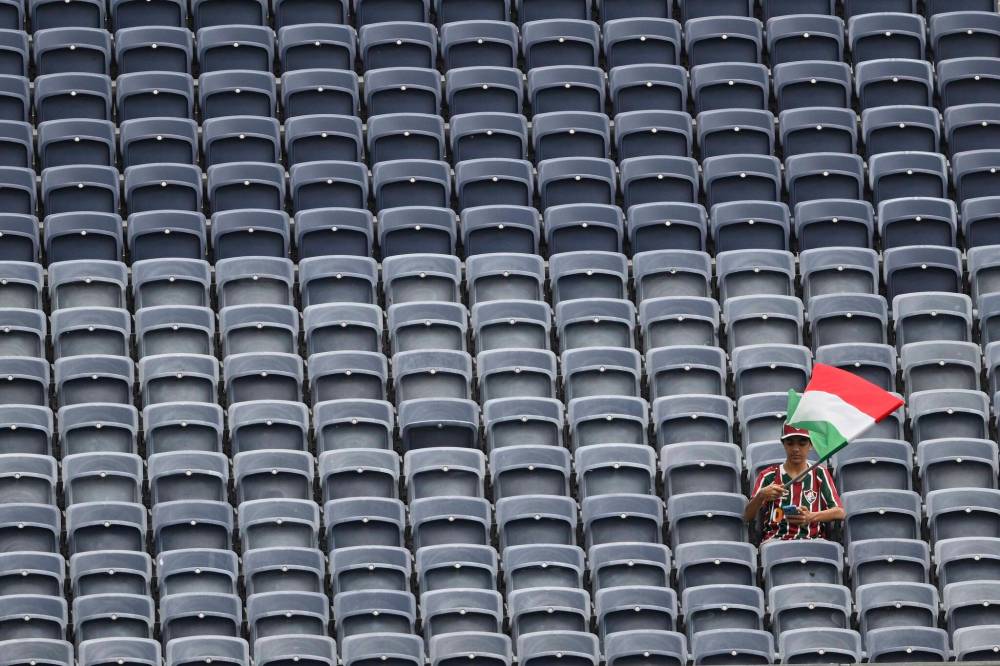Completely disastrous on every level
Could Club World Cup’s massive failure be a harbinger for 2026 FIFA World Cup
Advertisement
Read this article for free:
or
Already have an account? Log in here »
To continue reading, please subscribe:
Monthly Digital Subscription
$1 per week for 24 weeks*
- Enjoy unlimited reading on winnipegfreepress.com
- Read the E-Edition, our digital replica newspaper
- Access News Break, our award-winning app
- Play interactive puzzles
*Billed as $4.00 plus GST every four weeks. After 24 weeks, price increases to the regular rate of $19.00 plus GST every four weeks. Offer available to new and qualified returning subscribers only. Cancel any time.
Monthly Digital Subscription
$4.75/week*
- Enjoy unlimited reading on winnipegfreepress.com
- Read the E-Edition, our digital replica newspaper
- Access News Break, our award-winning app
- Play interactive puzzles
*Billed as $19 plus GST every four weeks. Cancel any time.
To continue reading, please subscribe:
Add Winnipeg Free Press access to your Brandon Sun subscription for only
$1 for the first 4 weeks*
*$1 will be added to your next bill. After your 4 weeks access is complete your rate will increase by $0.00 a X percent off the regular rate.
Read unlimited articles for free today:
or
Already have an account? Log in here »
Last month, on a sweltering Tuesday morning on the northern outskirts of Madrid, Javier Tebas dropped in at the renowned ESADE Business School, where a student asked him how FIFA might improve its expanded Club World Cup.
“By eliminating it,” he replied.
Tebas, president of La Liga, is rarely shy with his opinions and has made no secret of the fact he despises the tournament that will wrap up Sunday in East Rutherford, N.J. In fact, he’s on a campaign to destroy it.

PHELAN M. EBENHACK / THE ASSOCIATED PRESS
Fan support for the Club World Cup has been underwhelming at times.
At another university on July 2, Tebas proclaimed that he would “Do everything possible to ensure (the Club World Cup) doesn’t happen again.” His argument is the event funnels obscene amounts of money to Europe’s biggest clubs, further separating the elite of the club game from the rest of the pack.
Jurgen Klopp is similarly opposed to the monthlong event taking place in the United States. However, his objection has more to do with player safety and fixture congestion than FIFA’s brazen play for a piece of the club football pie, although he did tell Welt am Sonntag last week suits “Who have never had anything to do with day-to-day business are coming up with ideas.”
He added: “The Club World Cup is the worst idea ever implemented in football… I fear that next season players will suffer injuries they’ve never had before.”
For what? The glory of generation-defining moments in front of sold-out crowds and a broadcast audience of billions? Hardly.
No, the 32 teams that took part in the tournament, and the two that remain, did so to gratify a single man — FIFA president Gianni Infantino — and cement a business partnership he’s forged with Saudi Arabia, which is footing the bill for it. The U.S. was gifted hosting rights because, as Infantino is a stooge to the Trump administration, there was nowhere else to put it.
Not that Americans have much taken to the revamped competition, initially founded as an eight-team affair in 2000.
They certainly didn’t respond to the Pachuca-RB Salzburg match in Cincinnati, which drew fewer than 5,300 people. Chelsea, about to take on PSG in Sunday’s final, faced Los Angeles FC in an Atlanta stadium that was 31 per cent full. The 16 per cent turnout at the Rose Bowl for Urawa Reds-Monterrey was especially embarrassing, as the lack of interest was impossible to hide on television.
Atletico Madrid and Botafogo didn’t do much better at the famous Pasadena ground, but it all bottomed out when an Algerian journalist and contributor to The Athletic counted 557 fans who bothered to show for an Ulsan-Mamelodi Sundowns match that was weather-delayed by an hour.
It was one of several delayed games at the Club World Cup, and the regularity of the disruptions irritated Chelsea manager Enzo Maresca to the point that called the situation a joke. He went on to say — rightly — if so many matches are subject to delays and postponements, then this “is not the right place to do this competition.”
Even ex-Arsenal boss and current FIFA toady Arsene Wenger admitted the heat in some stadiums was “a problem,” although his organization might have done better to ensure the safety of its supporters than forcing them to empty their water bottles at the turnstiles.
It’s become quite clear, however, FIFA doesn’t care a jot about the people it expects to embrace its events.
The governing body had initially planned to highlight its anti-racism and anti-discrimination messages during Club World Cup matches, as is typically done at its other tournaments. The announcements and billboards were even pre-programmed, but then cancelled at the last minute. Given the Trump administration’s crusade against DEI initiatives, the reason was never a mystery.
Citing visa bans, arbitrary detainments and chilling limits on free speech and expression in the United States, Human Rights Watch has already advised FIFA to “reconsider the hosting decision” for next summer’s World Cup.
At the same time, the Sports & Rights Alliance has warned the World Cup risks being “held under discriminatory and exclusionary policies,” and the International Trade Union Confederation is “gravely concerned” about workers’ rights in the build-up to the competition.
If anything, such concerns will only grow as Infantino and FIFA eagerly conform to full participation in American neo-fascism.
The Club World Cup has been a trial-run for next year’s main event. Completely disastrous on every level, it makes one shudder to think what the 2026 World Cup might have in store.
jerradpeters@gmail.com
@jerradpeters.bsky.social


